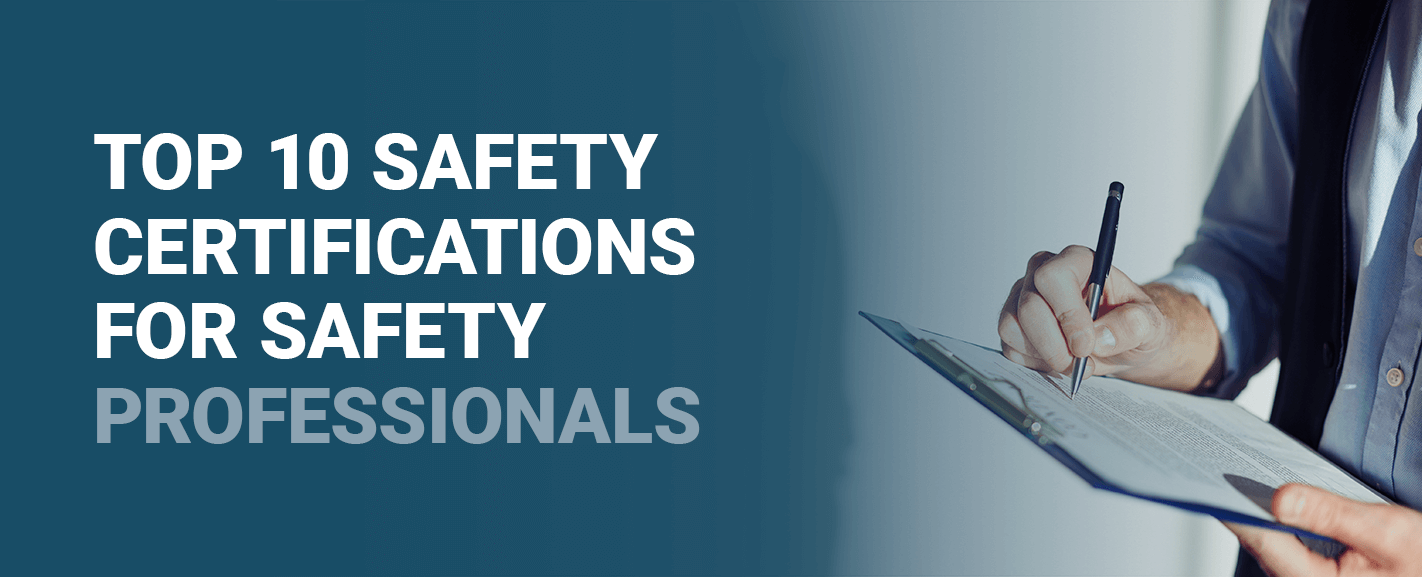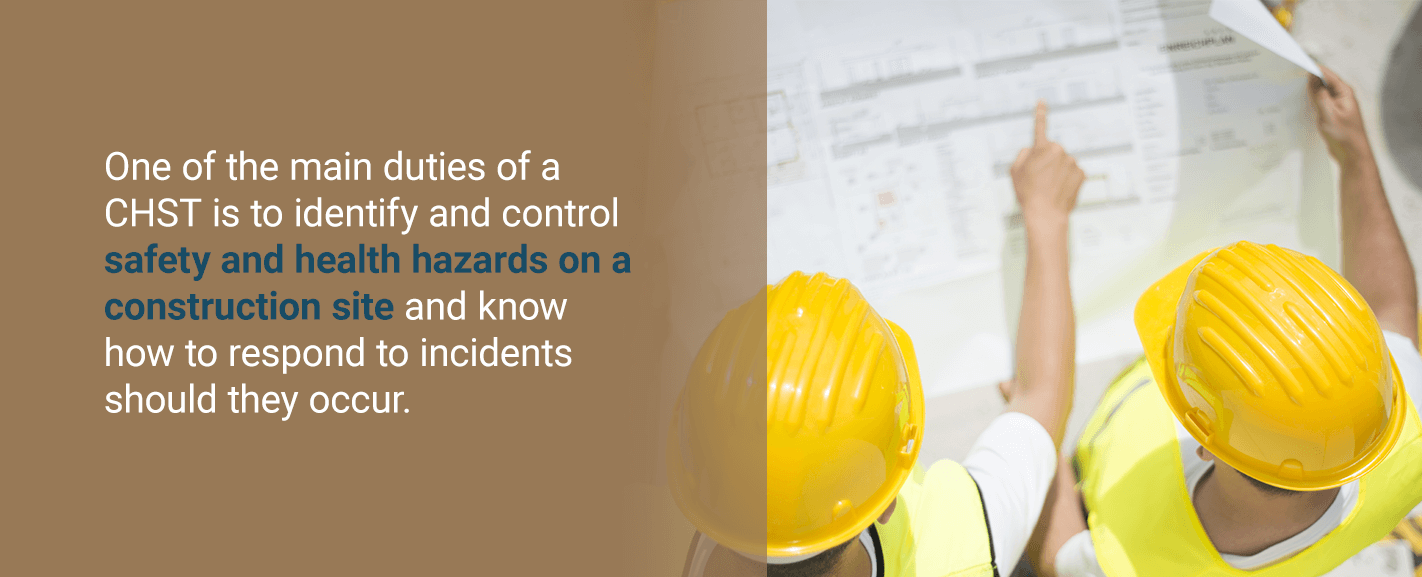Top 10 Safety Certifications for Safety Professionals

As a safety professional, you’re always learning. Proper education and experience are essential if you want to advance your career and help keep people safer on the job. But you need a way to show that you have the knowledge and experience needed to accomplish this. That’s where safety certifications come in.
Safety certifications are essential for current and aspiring safety professionals, regardless of their industry. Discover the best safety certifications for safety professionals—designed for whatever stage you are in your career.
What Is a Safety Certification?
A safety certification is a form of official proof showing that you have the knowledge and experience needed to perform various safety-related tasks. The process starts by meeting all the necessary qualifications and then taking the safety certification exam. After successfully completing the exam, you will have earned the safety certification.
There are many safety certifications available, with each one being suitable for a different career path. Depending on where you want to go in your career as a safety professional, you’ll need to choose the right safety certification that aligns with your goals. But how do you choose the best safety certification for you?
How to Choose Which Safety Certification Is Right for You
The best way to choose the right safety certification for you is to understand your goals. Everyone is on a different career path, so you need to choose the safety certification that will help you take the next step in your personal and career ambitions.
Consider these factors when choosing a safety certification:
- Your career aspirations
- The cost of the exam
- How much time you have available to study and train
- Your employer’s requirements
- The requirements needed to land a new job
- Regulatory requirements
- Your own desires and interests
By considering these factors, you will better understand what safety certification you need to obtain and how it will help you progress in your career as a safety professional.
Top 10 Safety Certifications
Here are 10 of the top safety certifications for safety professionals.
1. Master Safety Professional (MSP)®
An MSP is someone who possesses high-level strategic and specialist skills. MSPs often participate in developing and implementing facility-wide health and corporate safety programs and carry influence with policymakers and senior management personnel. They consider the broader social and organizational contexts that impact safety and health to create comprehensive solutions for their organizations.
2. Certified Safety Director (CSD)®
CSDs solve problems and apply safety strategies for organizations. They offer advice based on their extensive training, which provides them with technical and conceptual knowledge. They’re experts at analyzing evidence and critically thinking to find solutions. CSDs have an evidence base that helps them provide value in professional collaboration settings. They can work with very little supervision and are often the ones providing direction and supervision to others in a workplace setting.
3. Associate Safety Professional (ASP)
The ASP certification is for novices in the professional safety field who have at least one year of experience. They possess a wide range of environmental, health, and safety (EHS) knowledge, which they can use to answer questions and solve problems. Around half of their job duties involve safety tasks, which can take many forms. The ASP certification is a stepping stone toward getting one’s CSP certification for many safety professionals.
4. Occupational Hygiene and Safety Technician (OHST)
The OHST certification is essential for a safety professional who engages in occupational hygiene and safety activities on a part-time or full-time basis as part of their job duties. Their job duties include identifying hazards, finding solutions to control those hazards, preparing emergency response plans, and investigating safety incidents in the workplace. This certification provides safety credibility even for candidates who lack an associate’s or bachelor’s degree.
5. Construction Health and Safety Technician (CHST)
CHSTs work part-time or full-time on a construction job site with the goal of preventing construction-related injuries and illnesses. A CHST needs at least three years of work experience in the construction health and safety field. One of the main duties of a CHST is to identify and control safety and health hazards on a construction site and know how to respond to incidents should they occur.
6. Certified Safety Professional (CSP)
A CSP implements safety management systems, assesses hazards and controls, determines worksite risks, investigates incidents, evaluates and maintains loss and incident records, and prepares emergency response plans. A CSP can also have environmental management duties with responsibility for hundreds of employees. CSPs work in various industries, including manufacturing, healthcare, construction, insurance, and petroleum production and refining.
7. Safety Trained Supervisor (STS)
An STS is a leader within their organization. They are responsible for the safety and health of their workers. Executives, directors, managers, and supervisors could all benefit from an STS certification. The duties of an STS include maintaining a healthy and safe workplace, providing safety training, ensuring compliance with regulations, identifying and controlling hazards, correcting safety hazards, and communicating with safety specialists.
8. Certified Industrial Hygienist (CIH)
Having a CIH certification shows that you have knowledge, dedication, and passion for protecting people’s safety and health in the workplace and surrounding community. Here are some of the subject matters that CIH professionals are knowledgeable in:
- Air sampling and instrumentation
- Biohazards
- Epidemiology
- Engineering controls
- Community exposure
- Health risk analysis
- Noise
- Radiation
- Toxicology
9. Certified Hazardous Materials Manager (CHMM)
The CHMM certification is for safety professionals with knowledge concerning hazardous waste and materials management. Some of the common duties of a CHMM are planning for hazardous emergencies, handling emergencies that arise, and identifying, assessing, and reducing the risk of hazardous materials in the workplace. A CHMM can also analyze waste samples and help conduct site investigations and remediation.
10. Certified Safety and Health Manager (CSHM)
A CSHM has knowledge of occupational health and safety—coupled with a working knowledge of financial and business principles. A CSHM can analyze hazards, perform accident investigations, lead safety audits, handle workers’ comp situations, ensure product safety, obey environmental laws, and more.
Learn More About NASP Certification Exams
The National Association of Safety Professionals (NASP) is here to help you progress toward your goals as a safety professional. We offer online certification exams for the MSP and CSD certifications, which are two of the best safety certifications you can strive toward. We also offer online safety courses to provide the education you need throughout your career.
Contact us online today for more information or to take the next step toward obtaining your safety certification!
Related Posts






